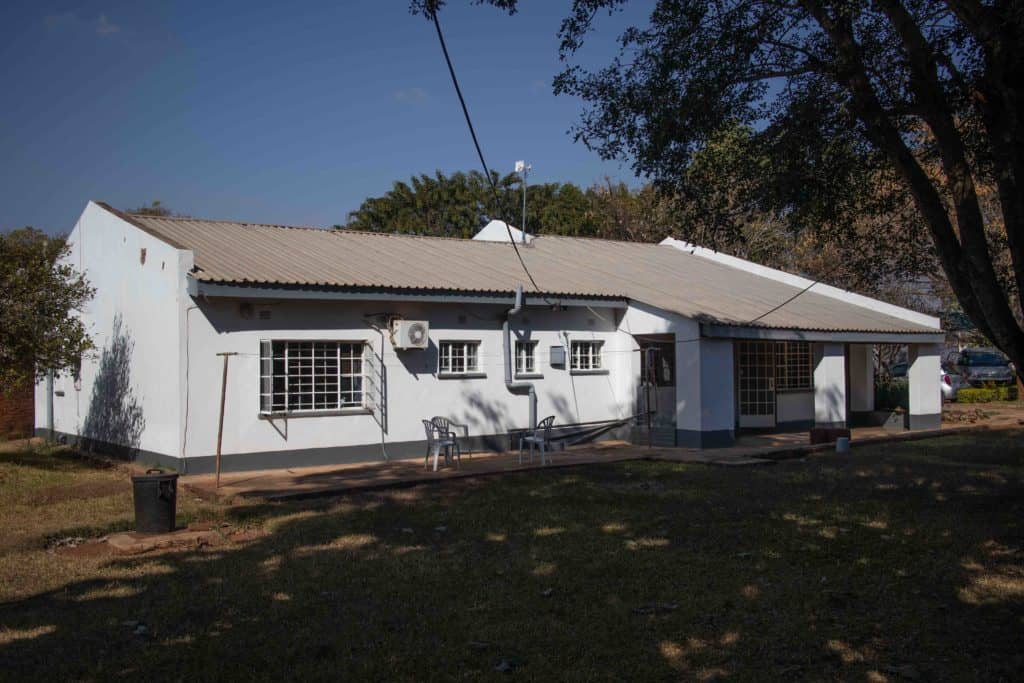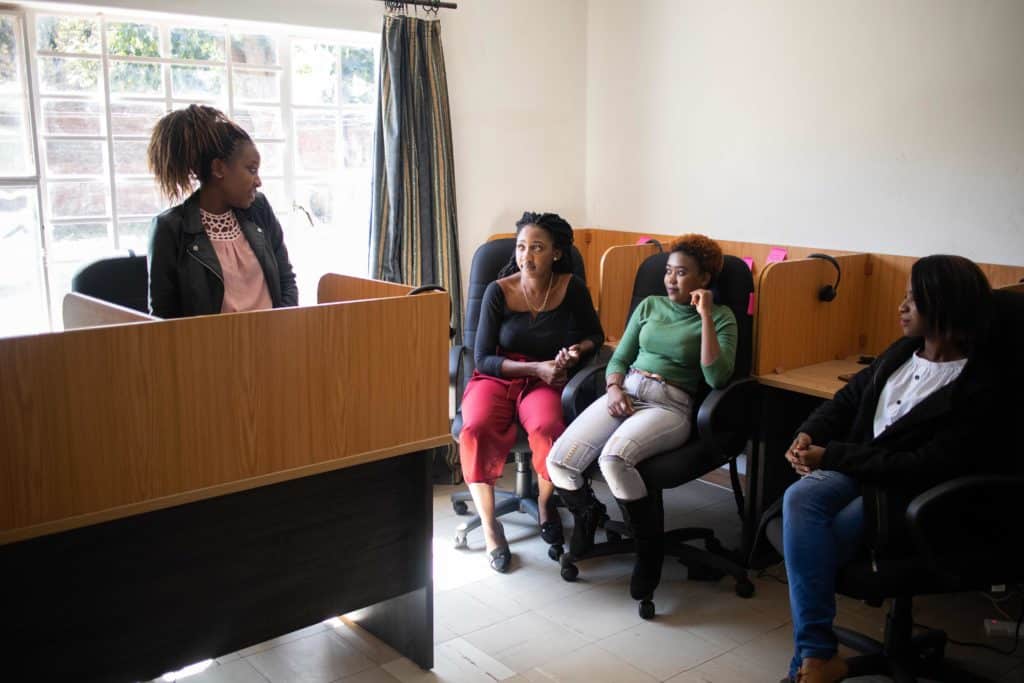Note from Aaron: GiveDirectly recently signed on to have their blog posts cross-posted to the Forum (just like GiveWell and a few individual users), so I’m starting with their most recent post (which I also liked a lot).
Whether you’re an individual or you represent an organization, send me an email if you’d like to have your own content automatically cross-posted!
The room is quiet — except for the occasional clacking of heels on cement flooring, the soft sip of tea, the clicking of computer keys. Then the hotline rings.
When recipients call the GiveDirectly hotline, they could be calling about anything: to ask about the status of a transfer, report theft, or just say “thank you.” GiveDirectly has a call center in every country we operate in, and all call center agents are locally hired. Agents both field calls from the hotline, as well as make followup calls to recipients who have been enrolled to receive cash transfers.
This summer, we interviewed Sithembile Nyondo, a call center agent in our Malawi office, to hear what she’s learned on phone calls with recipients. You can read the interview here.
GiveDirectly call centers track metrics such as call answer rate and drop rate, average answer time, talk time, pause time, and more. Optimizing our call centers aids us in improving our efficiency, and we’ve experimented with various types of staff training to hit aggressive target metrics (for example, you can read about how we implemented typing speed training in 2017 to increase productivity in our Kenya call center). The more cost-effective our call centers are, the more money we can deliver directly into the hands of recipients.
Tracking these metrics also holds us accountable in delivering a top-of-the-line customer service experience to recipients. Every successful customer-facing company has mechanisms for ensuring quality service. We think recipients of aid deserve the same and have designed our processes accordingly. We record calls and review a sample set each week to ensure quality; schedule around recipient availability by remaining reachable on weekends and at odd hours; and find alternative methods of communication for recipients who cannot speak to GiveDirectly over the phone (for example, we recently hosted a deaf recipient in the call center office to communicate in person).
As customer service hubs, GiveDirectly’s call centers exist to make recipients’ questions, concerns, and experiences heard. Our call center agents — who talk with recipients day in and out — therefore offer a unique lens on recipients’ experience with GiveDirectly. So we sat down with Sithembile Nyondo, a call center agent in GiveDirectly’s new Malawi call center, to catch a glimpse into what a typical day looks like in the call center and hear what she’s learned from recipients so far in her role.
Parts of our conversation with Sithembile have been lightly edited for clarity.
To get started, tell us a little bit about yourself, Sithembile.
I’m 26-years-old and I come from a family of four kids. I come from a place called Mzuzu, which is in the northern part of Malawi. I graduated with a degree in business administration and worked part-time with the Airtel call center, and then worked as an intern in the finance department of the Mzuzu City Council. GiveDirectly is actually my first permanent job, so it’s extremely exciting!

Why did you decide to work at GiveDirectly?
I figured that GiveDirectly was actually helping a lot of people, and I felt like, “OK, if I join this organization, not only will I be helping out to improve people’s lives, but I’m also going to work on self-development that can also help me.”
What makes a successful call center agent?
We need to be patient when we’re talking to recipients. We need to be very understanding. We need to hear what they’re saying. We have to have listening skills so we get the right information and are able to give them the right information. We also have to be really good at multitasking. And also we have to have a sense of humor. When the recipients crack a joke, even if it’s not funny, we interact with them.
Do the recipients often crack jokes?
Yes! The recipients are actually very funny. Today we’re making followup calls to recipients who have received funds, and they tell us, “Oh, I’m so happy, you don’t understand, I had nothing.” And they’ll laugh and crack jokes, and talk about how they danced when they received the money. So far, all the recipients have been very joyful. Of course there are some that had a few complaints. But most of them are very joyful.

What’s the first thing you do when you get to the call center?
First we have our team morning meeting. Today, the first thing people talked about in the meeting was the AE’s — the adverse events — because some of us are having trouble classifying them. Adverse events are any problems that happen before or after the transfer — like if someone’s money is stolen or the transfer causes a household conflict. One of the calls I got was that a lady has disappeared from her home with the money, leaving her children and her husband, and apparently she has moved to Mzimba, where she is with another man. In these situations, we try to do what is best for the family. For example, we’ll talk to both the husband and the wife, and ask them what they want to happen. Our options are to continue the transfers as before, cancel any future transfers, or split the transfers between the husband and the wife.

The Malawi call center meets for their morning meeting.
What happens after your morning meeting?
After the meeting we get on our computers for phone calls.
And how many calls did you make today?
About 18. And then I started calling back the people who didn’t answer yesterday.
Can you tell us the kinds of questions you ask when making followup calls to recipients?
Yes, the main types of questions are:
Did you face any issues cashing out?
Were the GiveDirectly staff polite and helpful when they visited you?
Have you had any problems as a result of receiving this money?
When people call into the hotline, what do they call about?
Many people call in to ask if they are eligible to receive a GiveDirectly transfer. Some call to ask about when they will receive their transfer. Others are actually just calling to thank. They call to say, “Oh, I just wanted you to know we received the funds. We are so happy so we just wanted to let you know.” Some people even call just to say hi, to see who is on the other end of the line.
What’s the most surprising thing you’ve heard on a phone call?
One thing that surprised me was a lady I talked to who said that there were some people who wanted to use the money for alcohol and things like that, but then they’ve had other recipients talk to them, and now they’ve invested in a business instead.
What’s the most common thing people say they spend money on?
Most are building houses. When I started working at GiveDirectly, I asked, “How come everyone is building houses?” And I got a very good answer, actually. Most of the houses are made of grass, so most people feel that now that they have money, well, grass, when it rains, it leaks. So they feel now that they have money they want to have a roof on their house.
Is there a phone conversation you’ve had that stuck out in your mind?
The second-to-last call I had, I was talking to the chief of one of the villages. One of the questions we ask is about sexual harassment because we want to be sure that recipients are being treated appropriately and respectfully. When I asked her, “Did anyone maybe show any inappropriate interest in you?” she laughed and said, “No, I’m old! But thank you so much for checking up on me.” Even though she thought the question was strange, it’s an important question we need to ask.
What do you think GiveDirectly could do better to ensure that people have fewer questions or fewer concerns?
I think eligibility should be made very clear. Even though we’re told in the call center that people in the villages are told at the baraza (the introductory informational meeting) that not everyone is going to get money, it seems that some people don’t know this information. That’s why they keep calling to ask what’s going on. And when we ask, “Did you understand what was told at the baraza?” some say, “No that part was not said.” I think that should be properly communicated so that people shouldn’t be disappointed.
[Note: Our call center agents conduct surveys to assess how well recipients understand various aspects of how transfers work. Below we’ve posted data from our recipient comprehension survey conducted during the Malawi pilot program in May 2019.]
What’s your favorite thing about working in the call center?
I think my favorite thing is interacting with someone I don’t know, but getting to have a connection with that person. Getting to talk to them. Getting to help them. One of the things I really like is when someone is telling us the impact of GiveDirectly, how happy they are, how joyful they are. You know, they’ll say, “Thank you so much, god bless you, we’re so happy.” It makes me feel like people are happy because of the organization and it also makes me feel like I am helping out to somehow make people improve their lives. In the call center, we actually get to interact with somebody who you have never seen, but somehow can get a connection.
What do want to do next in your career?
I’m still developing; I am not going to just stop here. I hope that someday I will be a manager because I did study business administration and one of the proficiencies is you can be a manager. So I feel like this is a big step here and I know that one day I’ll be a manager, maybe of this company or maybe of another company. Hopefully, as years go by, and I keep developing, I’ll be in an even better position.
This is quite interesting ( I have met quite a few people who have done aid work in Africa—Kenya, Ethiopia, Ghana, Ivory Coast and more) , and I sometimes wonder about political instability and conflict in some of these areas—its not everywhere, but does exist in other areas.
I am in contact with a person who basically is director of a small educational/permaculture (agriculture, tree planting) center in a village in Malawi (mostly focusing on orphans and girls) --he is part of a FB group I’m on (which has to do with ecology, sustainability and complex systems theory). He does ask for donations to his project (and they were hit hard by floods earlier this year, and operate on a ‘shoestring budget’ according to what I have read—they usually need donations for building materials, sometimes seeds, bicycles or a motorcycle , a computer and printer, internet connection, etc ).
I wonder if this project would be eligible for funding from Givedirectly. They tend to need small amounts (sometimes they operate on 5$/day). I also don’t really know if these campaigns (there are others on that FB page—eg one in Burundi) are ‘real’ . Others in the FB group have vetted them so I accept that view.
The person in that campaign told me over internet that he hasn’t heard of this Givedirectly project, and also that Mzuzu is far from his village.
GiveDirectly really only funds one thing: direct cash transfers. By keeping their operations very simple and streamlined, they’re able to work more efficiently. Your contact might be able to find support from other funders who specialize in projects like his, but GiveDirectly doesn’t have the infrastructure in place to support and monitor a project of that kind (at least, as I understand their functioning).
Thanks for info. Its possible his village would be eligible for participation in the cash transfer program, but that is really a larger scale and different kind of project.